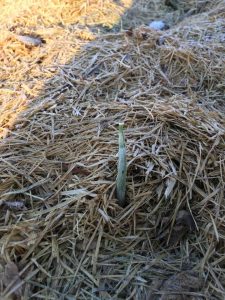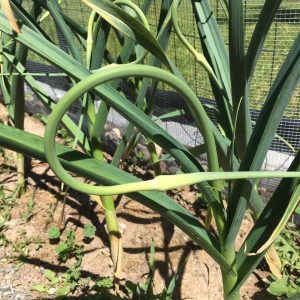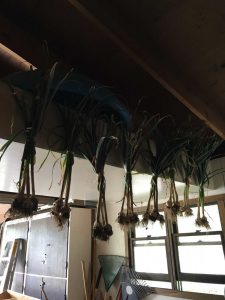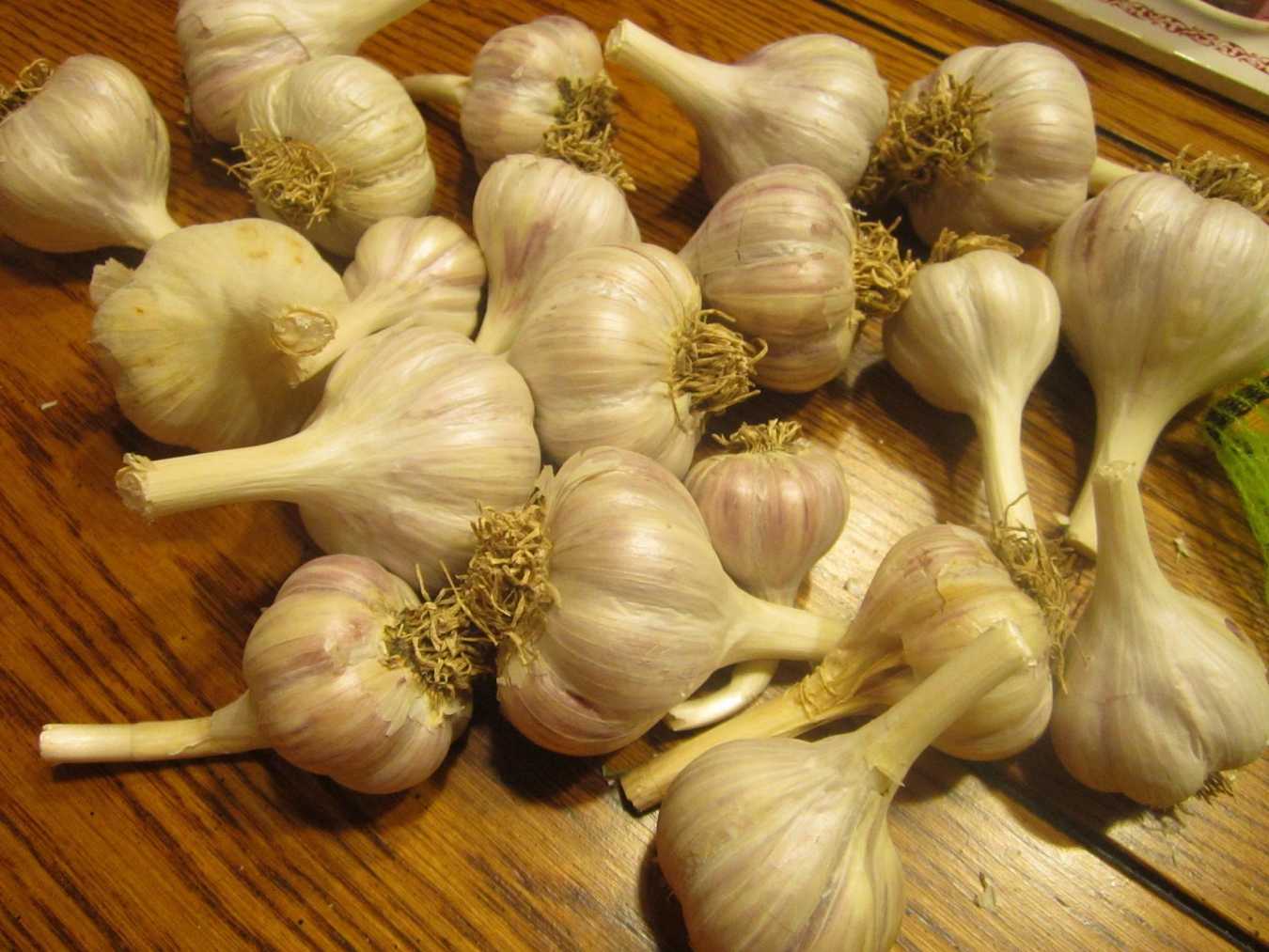Growing garlic in my garden has taught me a lot about death and resurrection. That probably sounds weird, but stick with me and I’ll explain.
Back in August, I realized that – in leaving my established strawberry and asparagus patches behind when we moved – I didn’t have any early spring plants to look forward to. That might not seem like a big deal, but I felt a little bit of grief as I thought about it. Winter can be bleak and harsh, and the days grow darker and the nights longer. Those first glimmers of spring – like the asparagus pushing through the ground triumphantly – can bring me a ridiculous amount of joy. But, this year, what would the signs of spring be? Where would the hope of warmer days be found? And, so I felt a little bit sad. Oh, well, there’s always next year, I thought to myself.
Can you tell I’m a well-trained Cubs fan? If not this year, there’s always next year.
I wondered what I could do to give myself little glimmers of spring during the winter, and the best thing I could think of was to order a free seed catalog. So, I did. The catalog came with beautiful pictures of all of the plants you could grow from the company’s seeds, and then in big, bold letters, I saw an advertisement in the catalog that read, “It’s not too late to plant garlic!”
I was surprised. I had never grown garlic before, but I knew most things were planted in the spring. I did some research and learned that garlic is best started somewhere between October and November, and it would grow under the ground (and a layer of grass clippings) all through the winter. That sounded like a lot of fun to me, and so I began researching the best kinds of garlic to grow. In that catalog, I happened upon a deal where you could buy a pound of irregular garlic cloves for a steal of a price, so I ordered it and waited for it to arrive.
A pound of garlic irregulars was a whole lot more garlic than I had bargained for (see picture up above), but I was so eager to plant the cloves. It seemed like an act of hopeful defiance (can you tell I take my gardening seriously?) as the temperature got progressively colder. Even with winter on the horizon, spring would eventually come. So, Jeff and I set to work planting 39 cloves of garlic – not even half of what had come in the mail.
We covered the newly planted garlic with a layer of grass clippings, and then we waited. We weren’t sure what we were waiting for. We’d never done this before. We weren’t sure how long it would be before the garlic began to grow, and we had no idea what it would look like when it did grow. But, I was excited about planting something new. Knowing that something may grow early in the spring was something I was really looking forward to.
The weather turned colder, and I found myself occasionally looking out at my garden and wondering if it was true that garlic would survive the winter. When the snow and ice came, and the grass clippings were covered with inches upon inches of cold, I wondered if we had protected the garlic enough. There was nothing to do except wonder and wait.
Let’s leave the story of planting garlic in my garden, and move to the article of the Apostles’ Creed we’re looking at together today: “He descended into hell; the third day he rose again from the dead.” The part that is rendered “he descended into hell” is perhaps one of the most debated pieces of the creed. Not only was this clause absent from the older manuscripts (though, the early church did believe it to be true), there is disagreement on how best to translate it. Some translations render it “he descended into hell.” Others translate it “he descended to the dead.” Which is it? And why does it matter?
The difficulty with this part of the creed is that we not only need to be able to translate the words from Greek or Latin into English, we also need to know what the early church understood these words to mean. The Greek text uses a word that means “the lowest parts,” although some Greek texts use the word “Hades.” The Latin uses the phrase “ad inferna,” which sounds an awful lot like something from Dante’s Inferno, but possibly referred to a commonly understood place of the dead, or the spirit-world. The early church’s understanding of these terms was varied, as I suspect it still is for us today. Different traditions and theological movements believe different things about what this part of the creed means. So, if it isn’t something that the church totally agrees on, why do we continue to recite it? What does it mean to say that we believe Jesus descended into hell – or to the dead – and rose again on the third day?
I want to focus on two reasons why it is important for us to claim this belief – 1) It assures us that Jesus defeated death, and 2) It assures us that there’s nowhere we can go that is too far away from Jesus’ reach.
First, Jesus defeated death. We know from Scripture – and from the Apostles’ Creed – that Jesus was crucified, he died, and he was buried. And, to make sure we’re clear on what happened, we’re told in the Apostles’ Creed that he descended into hell – or descended to the dead. Jesus didn’t just appear to die, or die some kind of spiritual death, he truly experienced the totality of death for us. In going through death, Jesus conquered death for us, and in his rising, he is “the first fruits of those who have died,” as it says in 1 Corinthians 15:20. If Jesus’ death was merely symbolic, or only spiritual, or simply an illusion, what hope would we have? The good news of the Gospel is that death – the final enemy – has been defeated in Christ Jesus, and we don’t need to be afraid because that battle has already been won.
Let’s take a look back at the garlic I planted in the fall. In the winter, cold temperatures brought ice and snow, and the garlic I had planted was completely covered over. The sky had that hazy, cloudy appearance that just looked cold and hopeless. The kids and our puppy wanted to go out and play in the snow, so I went out to watch them. I decided to take a peek at the garlic in my garden and was shocked to find that there were green leaves growing up through the snow. I was a little concerned. It was well below freezing. So, I dashed into the house to look up what I needed to do to protect the new plants. I was shocked to find that garlic is so frost hardy that it sometimes grows through the snow, and it tolerates the winter well. Even in the midst of the winter, there was hope for spring. When all of the other plants and leaves had faded, something new was happening below the ground, something I was getting the tiniest glimpse of.

We recite this part of the Apostles’ Creed – “he descended into hell/to the dead” – because it assures us that Jesus defeated death. But, we also recite this part of the creed because it assures us that there is nowhere we can go that is too far away from Jesus’ reach. He descended into hell – into the lowest parts – and he’s experienced and defeated the fullness of death.
In a discussion about what it means to believe that Jesus descended into hell, or to the dead, Danae Casteel said that thinking about hell or the place of the dead as “the lowest parts” brought to mind for her the idea of “rock bottom.” Even if we hit bottom, we know that Jesus has already been there, and because he was raised from the dead, we can have confidence that he will lead the way out.
Psalm 30 was possibly written as a thanksgiving after recovering from a serious illness. The opening verses say, “I will extol you, O Lord, for you have drawn me up, and did not let my foes rejoice over me. O Lord my God, I cried to you for help, and you have healed me. O Lord, you brought up my soul from Sheol, restored me to life from among those gone down to the Pit.”
Or as Elie Wiesel, survivor of the holocaust who died this past week, put it so poignantly in his Nobel Peace Prize acceptance speech: “This is what I say to the young Jewish boy wondering what I have done with his years. It is in his name that I speak to you and that I express to you my deepest gratitude. No one is as capable of gratitude as one who has emerged from the kingdom of night. We know that every moment is a moment of grace, every hour an offering; not to share them would mean to betray them. Our lives no longer belong to us alone; they belong to all those who need us desperately.”[1]
The psalmist says, “You have drawn me up…you brought up my soul from Sheol.” When things were the bleakest, the darkest, the most hopeless, God intervened. We are never so far gone that we are out of the reach of God. We believe in a God that not only can reach the darkest places of our lives, but intentionally goes there ahead of us so that we might have hope. We believe in a God that not only listens to our cries for help, but meets us where we are, no matter how “rock bottom” that place might be.

Anne Lamott one wrote, “There’s freedom in hitting bottom, in seeing that you won’t be able to save or rescue your daughter, her spouse, his parents, or your career, relief in admitting you’ve reached the place of Great Unknowing. This is where restoration can begin, because when you’re still in the state of trying to fix the unfixable, everything bad is engaged: the chatter of your mind, the tension of your physiology, all the trunks and wheel-ons you carry from the past. It’s exhausting, crazy-making.”
It’s at this point that Anne Lamott believes we pray the hardest prayer, but the one we most need to pray: “Help.”
In an interview with NPR, she explained, “Well, I’ve heard people say that God is the gift of desperation, and there’s a lot to be said for having really reached a bottom where you’ve run out of anymore good ideas, or plans for everybody else’s behavior; or how to save and fix and rescue; or just get out of a huge mess, possibly of your own creation.
And when you’re done, you may take a long, quavering breath and say, ‘Help.’ People say ‘help’ without actually believing anything hears that. But it is the great prayer, and it is the hardest prayer, because you have to admit defeat — you have to surrender, which is the hardest thing any of us do, ever.”[2]
“Help” might be the hardest prayer, but we have a God who listens to our cries and answers.
So, that garlic that was planted back in the fall? The hot weather we’ve had rushed it ahead of schedule, and we harvested a ridiculous amount of garlic last week.

It’s hanging in my garage to dry for winter storage.

But every time I look at it, I think about death and resurrection, about Jesus who defeated death and was raised to life as the first fruits of the dead, about how our mourning will be turned to dancing, about those green shoots springing up defiantly in the snow, and about the hope we have that we are always within the loving, compassionate reach of God.
*This sermon is the fifth sermon in a series on the articles of the Apostles’ Creed. This sermon focuses on: “He descended into hell; the third day he rose again from the dead.”
-For part 1: “Clear as Mud – a Trinity Sunday sermon”
-For part 3: “Taking a Road Trip – Feast of the Visitation“
[1] Elie Wiesel Nobel Peace Prize Acceptance Speech – https://www.nobelprize.org/nobel_prizes/peace/laureates/1986/wiesel-acceptance_en.html
[2] Interview with Anne Lamott on NPR – http://www.npr.org/2012/11/19/164814269/anne-lamott-distills-prayer-into-help-thanks-wow

